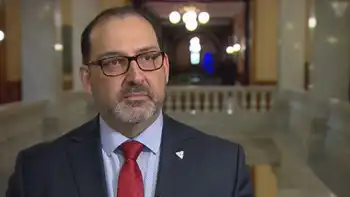Nissan makes first EV delivery in California
SAN FRANCISCO, CALIFORNIA - Japan's Nissan Motor Co delivered the first mass-market all-electric car to a technology entrepreneur in California as the company tries to get a jump in the nascent green vehicle race.
The first customer, Olivier Chalouhi, has been riding an electric bicycle to work, and he plugged his new car in for the cameras outside San Francisco City Hall. The charge point, one of 400 in the region, had a green official city sign near it that said, "Green Vehicle Showcase: Cars that make a difference."
The Leaf is one of a handful of mass-market fully electric or extended range plug-in vehicles slated to reach consumers in the next year.
The battery-powered Leaf, with an EPA-certified battery-only range of 73 miles is due to hit showrooms this month in a limited roll-out — along with Chevy Volts by General Motors Co. Ford Motor Co expects to deliver its first electric Focus compact cars late next year.
Carlos Taveras, the North American head of Nissan, said his company would focus on satisfying the first 20,000 Leaf customers before opening up for more orders next year.
"We are not in a rush," he told reporters, reasserting Nissan's plan to go straight to zero-emission cars, as opposed to the Volt with its gasoline engine that can recharge the battery to give it more range.
Work at Nissan's Tennessee plant was under way to have production capacity for 100,000 battery packs by early 2013, Taveras said, though he told Reuters that was not an indication of expected demand for the car.
The Leaf and Volt are seen as the spearheads of the greening of automobiles. But gasoline and diesel-powered cars with better fuel economy are seen as having more immediate impact on lowering greenhouse gas, mainly because of their greater numbers.
California, the most populous U.S. state, is the biggest market for conventional cars and is expected to be the biggest one for electric vehicles as well. The fact the Leaf is eligible for the California rebate, while the Volt is not, will be a selling point for Nissan.
The Leaf is also set to be delivered to Oregon, Seattle, Tennessee and Arizona, followed by Hawaii and Texas shortly after that.
As a pure electric car, the Leaf tops the Volt in the category on the EPA label that tracks greenhouse gas emissions from the vehicle. Since it carries no combustion engine, the Leaf has no such emissions, although greenhouse gases would be produced by the power plants used to recharge the car.
The Leaf will be priced at about $32,780 before a federal tax credit can bring the sticker price to about $25,280 and, in California, a rebate that can reduce it to about $20,280.
Journalists named it the 2011 European Car of the Year, the first electric vehicle to be chosen for the award.
Chevy's Volt — named Green Car of the Year and Motor Trend car of the year — is rated at 84 grams of carbon dioxide per mile, less than one-tenth of the industry's worst-performing vehicle on that score.
The Volt is designed to run for 35 miles on a full charge of its 400-pound 181-kg lithium-ion battery pack supplied by a unit of Korea's LG Chem. After that, a 1.4-liter engine extends the driving range to about 379 miles.
GM plans to build 10,000 Volts next year, 45,000 in 2012 and has begun discussing ways it could increase the production should there be more demand.
Capturing the fuel-economy leadership from Toyota Motor Corp's hybrid Prius would give GM bragging rights it has sought throughout the Volt development effort.
Related News

Ontario Energy minister downplays dispute between auditor, electricity regulator
TORONTO - The bad blood between the Ontario government and auditor general bubbled to the surface once again Monday, with the Liberal energy minister downplaying a dispute between the auditor and the Crown corporation that manages the province's electricity market.
Glenn Thibeault said concerns raised by auditor general Bonnie Lysyk during testimony before a legislative committee last week aren't new and the practices being used by the Independent Electricity System Operator are commonly endorsed by major auditing firms.
"(Lysyk) doesn't like the rate-regulated accounting. We've always said we've relied on the other experts within the field as well, plus the provincial controller," Thibeault said.
#google#
"We believe that we are following…




